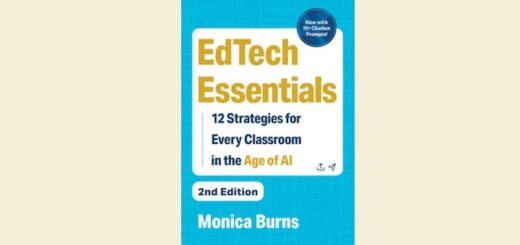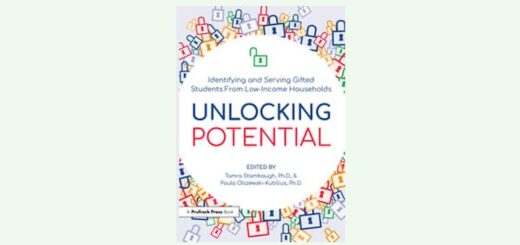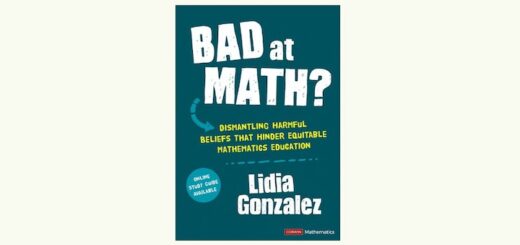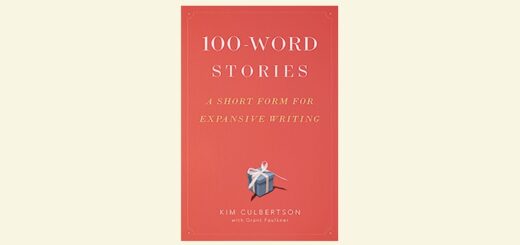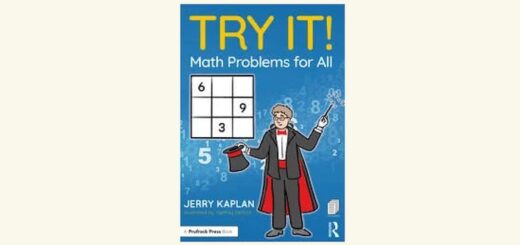Help Students Make the Most of Interviews
By Elizabeth Hagan, Lisa Friesen and Sunday Cummins

Elizabeth
“Interview an expert on this topic!”
“Interview a scientist in the field!”
“Interview a relative about this period in history!”

Lisa
Asking our students to interview someone sounds like an engaging learning activity, right? For many students, though, this may be a daunting experience, and while they may enjoy the break from traditional modes of learning like reading, writing and classroom discussions, they may not actually learn that much.

Sunday
Why? Because – similar to reading – listening to what we hear during an interview requires comprehension and the active construction of meaning.
If our students are not prepared to engage in this kind of deep listening, they may miss out on learning.
Setting Students Up to Succeed
So how do we prepare our students to benefit from the interview experience? In Scaffolding Learning, Scaffolding Language (2015), Gibbons writes, “Like reading, effective listening depends on the expectations and predictions about content, language, and genre that the listener brings to the text” (p. 184).
In other words, for our students to get the most out of an interview, we may need to teach them how to actively draw on three areas of knowledge:
✻ what they know about the topic
✻ what they know about the language used when talking about that topic
✻ what they know about the genre of “interviews”
In pursuit of exploring what this looks like, Elizabeth, a reading specialist, engaged a small group of fifth grade students in a project driven by the essential question, “What does it mean to ‘give back’?”
The group of students included two emergent bilinguals. One speaks Arabic at home and the other speaks Amharic. Both are at the expanding level on the WIDA standards for language proficiency.
Develop Background Knowledge
During lessons with Elizabeth, the students read a set of sources about people who have “given back” to their communities in some way:
✻ a girl started a lemonade stand to raise money for coats,
✻ a young man started a free bicycle repair shop,
✻ a boy, Noah, started a “cool bandage” project for kids who get lots of shots during cancer treatments.
A fourth “source of information” was an interview with Paul Long, a local motivational speaker, who is involved in many projects that benefit others including Noah’s bandage project.
The students were excited about the interview. One reason may have been that they understood the topic better and had some idea of what they might talk to Paul Long about during the interview.
Write Questions in Advance and Practice
Elizabeth’s students had never engaged in this kind of conversation with an adult expert so it was important to prepare. Drafting questions to ask a person during a structured conversation is one way to introduce students to the genre of the “interview.” Students get a sense of the give and take that will occur. This is also a chance to synthesize what a student has already learned about the topic and think about what might be important to learn during the interview.
When Elizabeth’s students did interview Paul Long, they seemed shy. They stuck to the questions they had drafted and did not ask Long for any additional details. On reflection we realized the students might have benefited from practicing this interview with others.
In Scaffolding Language Scaffolding Learning (2015), Gibbons describes how when we are in a conversation with someone, we are always drawing on “those ‘scripts’ that are familiar to us through previous experiences” (185). Practicing asking others the interview questions and thinking through the answers can deepen students’ comfort with the language they need to employ during this type of meaning-making format.
This kind of practice also provides students with an experience they can draw on later in more formal settings. In the future, Elizabeth plans to ask students to interview people they know first, perhaps even using the same set of questions they are planning to use later with someone they do not know as well.
Predict What the Interviewee Might Say
Because the students had already read and discussed three sources on the topic of people “giving back,” they had some idea of what Paul Long might say. As listeners we naturally draw on knowledge we already have on a topic to predict what a speaker might say. Noticing when something is being said that’s similar to what a listener already knows about the topic helps them monitor for meaning.
During the interview Long talked about his work on Noah’s Bandage Project, and the students’ eyes immediately lit up as they connected to information they had already read and discussed. Later they seemed to remember details from this part of the interview more easily than others.
Making predictions about what we will learn during an interview based on background knowledge also helps us notice when something is being said that contrasts or adds to what we already know about the topic. Paul Long told students that giving back doesn’t mean a person always has to give time or materials.
Just smiling at someone, he said, can be a way of “giving back” – a way of making someone’s day better. This idea had not been a part of the students’ previous discussions. They noticed the contrast and quickly latched on to this idea. (For fifth graders, giving a smile probably feels very easy to accomplish!)
Record the Interview for Close Listening
When our students are in the midst of an interview, it may be difficult to stop and take notes. This requires determining what’s important on the spot and then figuring out how to convey this in short bursts of writing. That’s a burdensome load for some of our students especially if they are learning English.
With this in mind, Elizabeth recorded the interview for the students to revisit later. She chose a short clip that addressed an aspect of “Why give back?” they had not discussed as they read the previous sources. She kicked off this follow-up lesson by asking the students to think about the question, “What did this conversation with Paul Long add to what I already know about this topic?” They listened closely and discussed what they heard, adding to their notes.
Interviewing others can be an engaging activity in any subject. With some intentional instruction, it can be an even more powerful experience, expanding knowledge and building useful skills for future learning opportunities.
Elizabeth Hagan is a reading specialist at Crestview Elementary, North Kansas City Schools. She is a graduate of Northwest Missouri State University and holds a master’s degree in Reading and in Teacher Leadership. In 2018 she achieved National Board Certification in Literacy: Reading- Language Arts/ Early and Middle Childhood.
Lisa Friesen is a District Instructional Coordinator for North Kansas City Schools, with a focus on coordinating MTSS – academic and behavior interventions. She is a graduate of the University of Kansas with a Bachelor’s in Elementary Education, Masters in Special Education and Doctorate in Teaching & Learning with an emphasis in Literacy.
Sunday Cummins is a literacy consultant and author and has been a teacher and literacy coach in public schools. Her work focuses on supporting teachers, schools and districts as they plan and implement assessment driven instruction with complex informational sources including traditional texts, video and infographics.
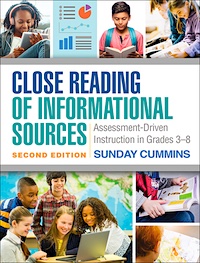
She’s is a graduate of Teachers College, Columbia University, and has a doctorate in Curriculum and Instruction from the University of Illinois, Champaign Urbana. Visit her website and read her regular blog posts on teaching information literacy. Follow her on Twitter @SundayCummins.


















